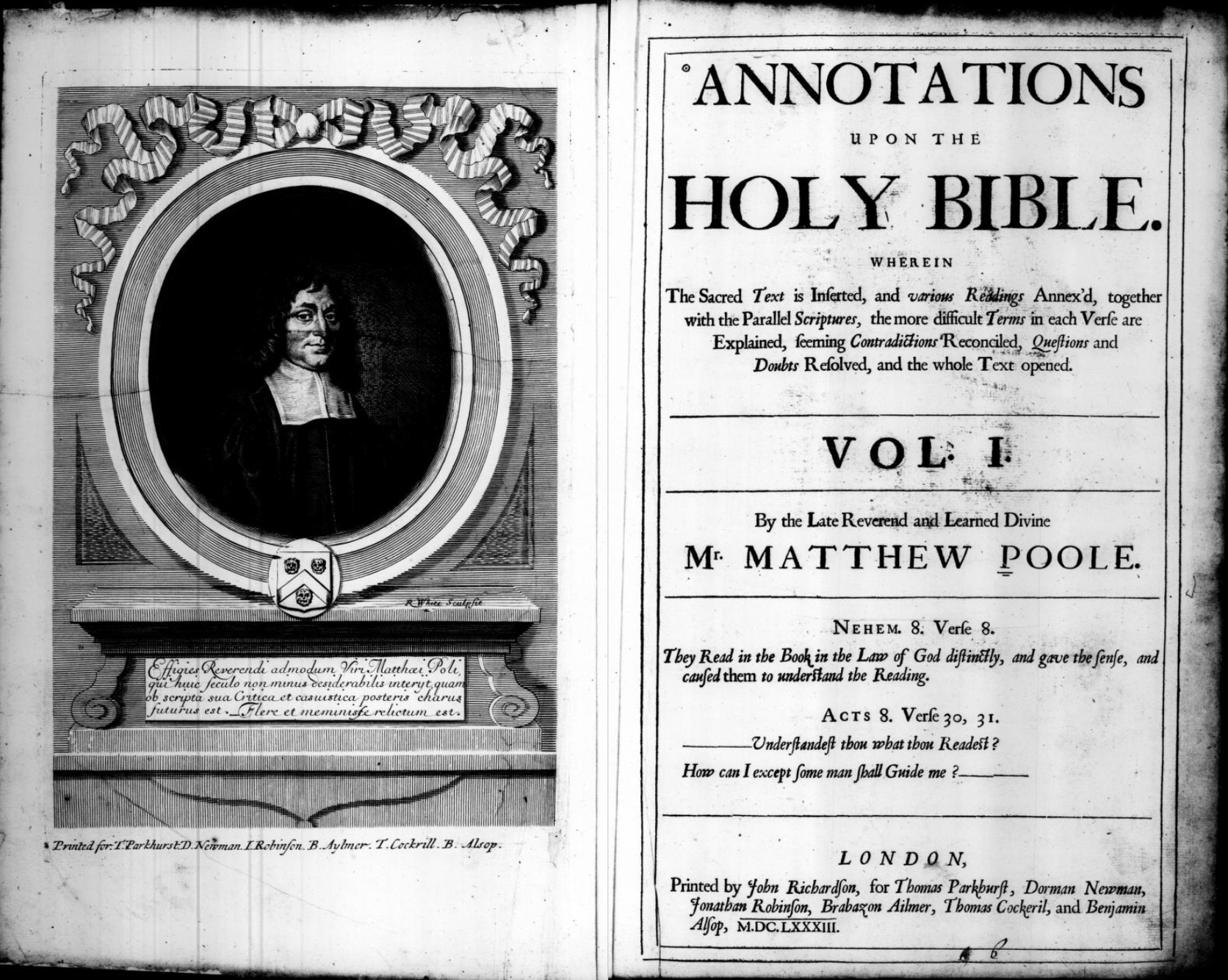A Journal for Church Officers
E-ISSN 1931-7115
Contents
Pictures of Heaven: The Covenant of Works in the Theology of Meredith G. Kline, Part 2
by Gregory Edward Reynolds
Matthew Poole: Exemplar of Traditional Exegesis
by Harrison N. Perkins
The Church: Not Politicized nor Ghettoized, but Spiritual: A Review Article
by Bryan Estelle
Bach against Modernity: A Review Article
by Stephen M. Michaud
Fault Lines: The Social Justice Movement and Evangelicalism’s Looming Catastrophe by Voddie Baucham
by Darryl G. Hart
by George Herbert (1593–1633)
From the Editor. For Reformation month, Harrison Perkins explores the significance of the life and ministry of Matthew Poole (1624–1679) in “Matthew Poole: Exemplar of Traditional Exegesis,” celebrating the 400th anniversary of his birth. He was an important theologian and minister in the post-Reformation period of the first phase of “High Orthodoxy” (1640–1685) which produced the broad, explicit exposition of Reformed tradition. Most Christians know Poole through his excellent popular four volume Annotations upon the Holy Bible (1683). Along with his pastoral concerns and undergirding his ministry was profound scholarship. Perkins focuses on Poole’s traditional or precritical exegesis which formed the basis of his theology, contrary to much modern scholarship which has depicted post-Reformation theologians as constructing an abstract system similar to medieval Scholasticism.
As I said in the August-September issue, “The Covenant of Works in the Theology of Meredith G. Kline” was originally written for a festschrift that was never published. It is here the second of two parts, lightly revised in the hope that it will elucidate the late Meredith G. Kline’s profound reflections on the nature of the biblical covenants, especially the importance of distinguishing the covenant of works, in its various biblical manifestations, from the covenant of grace. While not every officer will agree with everything Kline has written on this topic, or my exposition of it, my intention is to add to the conversation, which has been continuing since the Reformation.
Bryan Estelle’s review article, “The Church: Not Politicized nor Ghettoized, but Spiritual,” reviews Alan Strange’s recently published Empowered Witness: Politics, Culture, and the Spiritual Mission of the Church. Estelle commends the book for its thorough exposition and defense of the classic Reformed doctrine of the spirituality of the church. He also adds an interesting series of areas that need further historical and theological expansion. This doctrine is the necessary remedy for the cultural transformation being promoted by many in the church today.
Stephen Michaud’s review article, “Bach against Modernity,” reviews Bach against Modernity by Michael Marissen. If anyone has a notion to co-opt Bach as a protomodernist, they will meet with formidable opposition in this excellent book. Marrisen presents a multidimensional argument to demonstrate that Bach’s music, secular and sacred, was rooted inextricably in his orthodox Lutheran faith. Musicologists, musicians, and listeners alike will enjoy this book.
Darryl Hart reviews a controversial book: Fault Lines: The Social Justice Movement and Evangelicalism’s Looming Catastrophe, by Voddie T. Baucham, Jr. Baucham sets forth a clear warning about the dangers of CRT (critical race theory, emanating from neo-Marxism) for the church and its ministry, where this teaching has gained a hold. (By now the common idiom may be DEI rather than CRT—Diversity, Equity, and Inclusion, along with ESG in the corporate world—Environmental, Social, and corporate Governance).
Our poem “Church-lock and key” by George Herbert is a tribute to the spirituality of the church. Its title was changed from “Prayer” to “Church-lock and key,” even though the word “church” is nowhere to be seen in the poem. It is simply an honest and humble prayer for forgiveness based on the shed blood of the Lamb. But Herbert realized that this is what is found in the church fulfilling its basic gospel mission of Word and sacrament. The gospel emanates from the visible church as the heart of its God-given treasures.
The cover is the frontispiece portrait of Matthew Poole next to the title of the first edition of this famous commentary on Scripture, Annotations upon the Holy Bible, published in 1683. It comes from the Internet Archive.[1]
 |
Blessings in the Lamb,
Gregory Edward Reynolds
FROM THE ARCHIVES: “SPIRITUALITY OF THE CHURCH, EXEGESIS”
/OS/pdf/Subject_Index.pdf
Ordained Servant exists to help encourage, inform, and equip church officers for faithful, effective, and God-glorifying ministry in the visible church of the Lord Jesus Christ. Its primary audience is ministers, elders, and deacons of the Orthodox Presbyterian Church, as well as interested officers from other Presbyterian and Reformed churches. Through high-quality editorials, articles, and book reviews, we will endeavor to stimulate clear thinking and the consistent practice of historic, confessional Presbyterianism.
Contact the Editor: Gregory Edward Reynolds
Editorial address: Dr. Gregory Edward Reynolds,
827 Chestnut St.
Manchester, NH 03104-2522
Telephone: 603-668-3069
Electronic mail: reynolds.1@opc.org
© 2025 The Orthodox Presbyterian Church